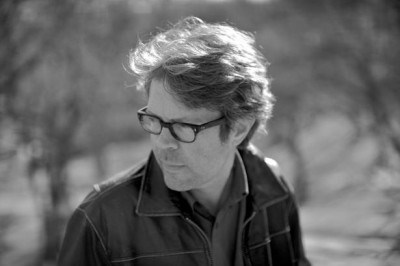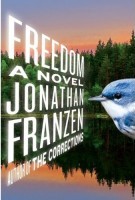 Jonathan FranzenPhoto: Greg MartinJonathan Franzen’s blockbuster novel Freedom has been called the War and Peace of our day. Is it also our Silent Spring?
Jonathan FranzenPhoto: Greg MartinJonathan Franzen’s blockbuster novel Freedom has been called the War and Peace of our day. Is it also our Silent Spring?
Reviewers have almost unanimously lauded Franzen for capturing the early-21st-century American zeitgeist. Time knighted him the “Great American Novelist.” Oprah picked Freedom as her final book club selection. New York Times reviewer Michiko Kakutani described the novel as “an indelible portrait of our times.”
What reviewers have almost unanimously ignored, however, is that this indelible portrait of our times is also an indelible portrait of contemporary environmental activism rendered through the protagonist Walter Berglund. Walter — introduced on page one as “greener than Greenpeace” — is a car-phobic cyclist who works at The Nature Conservancy, frets about overpopulation, develops homicidal feelings toward bird-eating housecats, and at times prefers warblers to his wife. When Walter’s passion for one rare warbler species leads him to consider a Faustian deal with a mountaintop-mining coal company, we watch him confront the absurd tradeoffs that have come to define modern environmentalism.
In interviews and essays, Franzen has made no secret of his own devotion to the natural world, and has even confessed to wearing a birding bra. I recently met with the author at his apartment on the Upper East Side of Manhattan to tease out the environmental themes in his book, discuss how environmentalists can be more effective, and quiz him on his bird knowledge (watch video of the quiz). I left Franzen’s apartment thinking that this great American novelist also deserves recognition as a great American activist.
Q. Is Freedom an activist book? Do you hope that readers will come away with more of an appreciation for the natural world after reading it?
 A. In general, I try not to do overt advocacy with my writing. If it’s a byproduct, and people become aware of an issue because it’s part of the story I’m telling, that’s great. But it’s not the primary motive.
A. In general, I try not to do overt advocacy with my writing. If it’s a byproduct, and people become aware of an issue because it’s part of the story I’m telling, that’s great. But it’s not the primary motive.
The one small part of the book that had an actual activist motive was the very end, where we’re introduced to a predatory housecat that’s running outside and killing songbirds by the scores. When it occurred to me that I could end the book with the main character Walter’s problems with this cat, I realized that I could also perform an educational service. Most people aren’t aware of the degree to which free-roaming outdoor cats are a problem in this country. At least a million birds a day are killed by them, so we’re talking about a minimum of 365 million birds in America alone in the course of a year — perhaps as many as a billion. So there was an educational impulse there.
Q. I found your “My Bird Problem” essay in The New Yorker to be moving and persuasive. I finished it and thought, “Man, I need to go scout some birds!” Walter’s a birder, but his relationship to birds isn’t attractive in the way that your own birding stories are. Do your activist motives play out in your nonfiction more than in your fiction?
A. It’s a tricky thing. As a reader, as soon as I sense that I’m reading a piece of straight-up environmentalist advocacy, I put the piece of writing down. I feel like I’m already the converted, so don’t try to convert me. Tell me something interesting.
Even in nonfiction, I don’t want to take a purely advocating stance. I’m trying to complicate things. “My Bird Problem” is an essay about how I went from a general pissed-off concern about the environment to a very specific, positive passion for birds, which are part of the environment. Of course, it was also an opportunity to bring along readers who might not have thought about birds so much before. That’s a real and potentially useful secondary effect. But my primary responsibility to the reader is to say, “Look, this stuff is complicated — trust me, I’m not here to beat you over the head.”
Q. Your book presents a spectrum of environmentalists: on one end, the Jocelyn Zorn character, a radical purist; in the middle, there’s Walter, the soggy, old-school, bike-riding pessimist; then you have Lalitha, the fresh, pragmatic, tech-savvy optimist. Where do you see yourself on that spectrum?
A. I am involved with the American Bird Conservancy, which is an incredibly effective environmental outfit. We don’t have a huge budget, but we have amazing leverage in getting other people to spend money to do things to help wild birds in the Americas. And one of the things I’ve learned through my involvement with ABC is how painful the compromise process can be for people doing hands-on environmental work.
There is a place for radical stances — Greenpeace with the whales, some of the anti-mountaintop-removal stuff going on in Appalachia. And you can actually sometimes succeed by taking the really hard-line position. But much more often, if you talk to the people doing the work and getting things done, it’s a gut-wrenching compromise every day. You have to cultivate extremely wealthy people. You have to cut very imperfect deals with industry. People have said to me, about Freedom, “Oh, you must be satirizing this poor Walter Berglund who gets corrupted when he sets out to do good.” In fact, what I was after was a purely realistic portrayal of contemporary conservation work in Appalachia.
Q. You’ve said Freedom is your first non-satirical work of fiction. I did interpret Walter as a satire — as the desperate, failing, wacky environmentalist who’s saying let’s chop down mountains and destroy rivers to save this one rare bird. Do you think it’s realistic to blast mountains and destroy river systems to save a bird?
A. That’s a tough call. How do we continue generating electricity in this country? You want more nuclear? You want to cover this country with wind turbines? Wind power’s impact on wildlife alone is very, very substantial. The impact on the sense of there being an outdoors that isn’t just a factory for power is radically altered if you cover the landscape with turbines. Natural-gas drilling also has a huge negative impact. It totally fragments the habitat. It renders it unusable to the most sensitive species, which are the ones we’re most concerned about. And everyone’s talking about MTR [mountaintop-removal mining] in Appalachia while the gas drillers there are having a field day. So the question is really, really complicated.
Walter comes to feel that coal is maybe not so bad. He sees that we aren’t going to stop using coal in this country, and he asks, “Why don’t we talk a
bout how to do it better, how to do it right, rather than taking extreme positions that feel good but have no realistic alternative solutions to offer?” His position is not my position, exactly — I’m an agnostic on this stuff. But I don’t actually think it’s a crazy position to take.
Q. Do you think that environmentalists, in general, are unwilling to engage in the kind of pragmatic compromise you’re describing?
A. I used to have a really angry, despairing sense that the world is screwed, that people have screwed the world, and so we should just let it all end. Let’s have the great plague that will reduce the population by 90 percent, and let the land regenerate and nature catch its breath. I’ve moved away from that sort of deep-ecological extremism, which I found to be not personally tenable. It was time for me to stop thinking about apocalypse, time to move to New York City, time to start enjoying life. And from there I moved on to loving wild birds, which was a much more positive mode of engagement. I started to think, what can we do for wild birds right now? I don’t want these particular species to disappear. So what can I do practically? If you’re trying to save your child’s life, you might make certain compromises that you would have found morally insupportable at a younger age. Love leads to pragmatism in a way that anger doesn’t.
Q. There’s an episode of South Park in which Prius drivers are emitting “toxic levels of smug.” Do you think that the environmental movement is failing to reach people because it gives off too much of an air of judgment?
A. It’s certainly a danger. There’s a moment at the very end of Freedom where Walter, instead of attacking his neighbors for letting their cats roam, suddenly takes the new approach of getting a biologist to lead nature walks for his neighborhood. It’s a huge breakthrough for him, to actually show the neighbors what’s in the woods. He’s saying, essentially, “I don’t hate you. I don’t hate your cats. I just love these woods and the birds in them, aren’t they beautiful? Might you think twice about your behavior in the light of that?”
As long as nature remains an abstraction, or some kind of moral whipping post, people aren’t going to connect their actions to the effects they have on nature. If environmentalism is trapped in a we’re-doing-good-you’re-doing-bad dichotomy, it misses the chance to be effective, to actually change people by making them care about something instead of react against something. Real change occurs when people begin to positively care.
Q. Walter’s friendly nature-hike approach instantly depoliticizes the issue. It’s celebratory.
A. It’s celebratory, it’s depoliticizing, and it’s not abstract. One of the big problems for people who want to do something about climate change is that the welfare-of-your-grandkids argument is totally abstract. Ditto Bangladesh flooding. That’s a long way away. Who cares? You can threaten people by telling them that bad things are going to happen to you. But it smacks of Protestant morality: “You’re sinning, and you’re all going to hell. You’re sinning against the environment, and the hell will be an environmental hell.”And so the smugness of the environmentalists is maybe akin to the smugness of the saved: “I’m walking around saved!” “I’m walking around in my hemp shoes!”
Q. Why did you choose to focus on overpopulation instead of climate change? Overpopulation is, some might say, a dated environmental issue, while climate is on the front of everyone’s mind.
A. I had already touched on climate change in my two previous novels. And as a novelist you don’t want to be chasing after the culture — you want to be listening to stuff that’s not being talked about but that might become important. A novelist tries to go to places that people don’t normally want to go. And it was interesting to me how totally unmentionable overpopulation has become in mainstream conversation. If you imagine the entire culture as some kind of psyche, you wonder: “Why is this rather important knowledge being repressed? Why are we willfully blinding ourselves to this?” Repressions like this are a provocation for the fiction writer.
Q. Do you think that overpopulation may become a bigger concern than climate change going forward?
A. I’m not Walter on the subject of overpopulation. Birth rates tend to decline when nations reach full development. A number of countries in Europe now have negative birth rates, and the U.S. population right now would be stable were it not for immigration. The U.N. commissions see world population peaking, all other things being equal, sometime in the next 50 years, and then trending downward.
The question is whether there will be anything left in the world to save by the time that happens. Practically speaking, it all depends on resource consumption. A hundred Americans do a lot more damage to the environment than a thousand Sudanese.
But Walter’s concern isn’t practical as much as it is poetic. He’s responding in a visceral way to the crowdedness of the planet, to a feeling that there is no other thing left, there is only us. We’ve made this planet a human theme park. He’s responding to the symbolism of every last acre of the planet being somehow meddled with and made into just another backyard.
Q. At one point Walter freaks out and shouts, “Humans are a cancer on the planet!” Was that cathartic to write? Do you agree with him?
A.You know, on a bad day, taking a drive and trying to find some place that isn’t covered with sprawl, I feel like we’ve experienced cancerous growth rates. There once were these functioning cities, there was farmland, there was the wild. It seems like there was once some kind of balance. When you see sprawl plotted out on maps, it really has this cancerous look.
But was writing that cathartic? Not really. Again, I don’t want to write stuff that harangues people. I don’t want to preach. For me, the kind of work that’s satisfying is to set up a book in which issues I care about are presented in a complex way. In all modesty, I feel I did a good job of representing what it’s like to try and do environmental work now. Careful and entertaining representation is what feels good to me, not the rant.
Q. I found it interesting that Walter’s relationship to the natural world becomes increasingly passionate as his personal life unravels. Do you think that devotion to the natural world can be socially isolating — possibly even a form of emotional dysfunction, an escape from human relationships and problem-solving?
A. If you take a devotion to other species to its logical conclusion, you reach a point of pretty radical misanthropy. And my job as a novelist is to care deeply about human beings, to find their psychology and their stories and their plight compelling. One of my aims in Freedom was to find a way to express some of the radical misanthropy, but also to knit it into a matrix of human relations, to put it in context, to put it in perspective.
Q. What advice would you have for anyone — writer, journalist, activist — who is trying to engage and move people on an environmental issue?
A. Nowadays I get sent a lot of books that are extremely well-meaning exposés of environmental issues, and also books that are celebrations of the beauty of nature. Strangely, I am so much a humanist that it’s very hard for me to get interested in these thing
s. The best way to engage me is to find interesting ways to talk about yourself and your relationship to the world. To trick me, basically. Interest me in your human story, and then, once you’ve got the thing going, start working in the information that I might otherwise be resistant to. Engaging people on the environment is really, really hard. You should never underestimate the difficulty.
Q. There has been an enormous amount of response to Freedom, but almost no response to the environmental themes. Why?
A. I don’t know why. Maybe interviewers are trying to do me a kindness and not scare away readers by making the book sound too environmental.
Q. Was Oprah receptive to the environmental themes of the book?
A. We didn’t talk about it at all. But the producers did offer to put a link to the American Bird Conservancy on the Freedom webpage.
Q. Could you share a memorable bird-sighting moment?
A. We’re sitting here in my apartment in New York, and I’ve seen about 40 species of birds out the window in back. It just faces a courtyard — we’re right in the middle of Manhattan. Interesting things come through in migration. I glanced out the window one afternoon and saw what I thought was a mourning dove. But something about the tail shape was all wrong for mourning dove, and so I got out my binoculars, and what did I see? A yellow-billed cuckoo! Cuckoos are basically tropical species. We only have two species that migrate north in the summer, and to see that bird in the middle of Manhattan was incredible.
Q. How many birds are you up to now?
A. In North America, maybe 630.
Q. How many more do you have left to go?
A. Anything over 700 is considered kind of great.
Q. So you’re almost there.
A. The last 70 are the hardest 70.
Q. And when you’ve seen them all, then what?
A. I want to do what I can to help ensure that Americans will always have these birds to see.
Watch Jonathan Franzen play a bird identification game with Grist’s Amanda Little:
Watch more video clips from Grist’s interview with Franzen, as part of Ask Umbra’s Book Club discussion of Freedom:
- Franzen on whether caring about the environment can lead to social dysfunction and “radical misanthropy”
- Franzen on environmental compromises and energy options
- Franzen on overpopulation
- Franzen on cats killing birds, and talking about environmental issues to the unconverted



